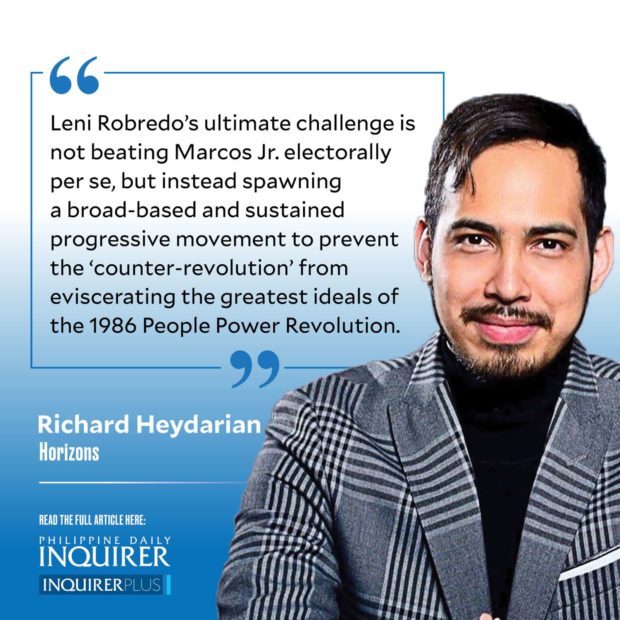Can Leni beat Marcos Jr.?
They say there is always a first time for everything. This is especially true in the world of politics, where change and unpredictability often defy our most fundamental conceptions of human nature. Just over a century ago, even just the idea of woman suffrage was largely unthinkable across much of the supposed “civilized” world.
For instance, it was only in 1918 that Britain, at the height of its imperial power, granted propertied woman over the age of 30 the right to vote under the Representation of the People Act. But history is far from unidirectional.
Over the past half-a-decade, we have seen the world’s flagship democracies, from the United States to Britain, succumbing to populist hysteria and demagogic shenanigans at the highest levels of governance. In short, there is nothing “inevitable” in politics, since human beings, the constituent elements of any body-politic, are at once both reflexive and emotive—a recipe for wondrous unpredictably and confounding madness. This is why half-a-century since Isaac Asimov’s “Foundation” Trilogy, his concept of “psychohistory” has remained in the realm of science fiction.
Nevertheless, it’s hard to ignore certain trendlines in our upcoming presidential elections. Former senator Ferdinand “Bongbong” Marcos Jr. is seemingly amassing a prohibitive lead over all other rivals, including Vice President Leonor “Leni” Robredo, the leader of the opposition, who has consistently placed second in authoritative surveys. But does that make a Marcos Jr. victory inevitable? Will the ex-dictator’s son become the first majority-elected president in contemporary history?
To begin with, it’s hard to deny that the revitalized remnants of the ancien régime have a couple of things going for them. One thing to keep in mind is precedence, namely the 2019 elections, which I described as a “Monday night massacre: Hail King Duterte?” (5/21/19).
Instead of checking the excesses of the populist incumbent, the elections saw “an absolute, complete and untrammeled evisceration of the opposition,” with the “enervated liberal democrats and progressives were outgunned, outgooned and outgolded.” For the first time in 80 years, the opposition failed to win even a single seat in the upper-legislative chamber.
Moreover, critics have also raised concerns over the integrity of the very guardrails of elections. For instance, many have been confounded by both the substance and circumstances of the Commission on Elections’ ruling on the disqualification cases against the current frontrunner. Above all, this is not just another presidential election, but instead the ultimate manifestation of a “counterrevolution” by the Marcoses exactly three decades since their return from luxurious exile.
But the fight is far from over. First of all, Marcos Jr.’s numbers have shown tremendous variability. Just two quarters ago, he was placed third with only 13 percent of prospective votes. Much of his recent surge is due to a Sara Duterte-driven bandwagon across “Solid South” Mindanao. The latest Pulse Asia survey (Jan. 19-24) shows that Marcos Jr.’s largest mega-geographic base of support is now in Mindanao (66 percent), way higher than in Visayas (53 percent) or the National Capital Region (57 percent).
An authoritative digital survey, commissioned by the International Development and Security Cooperation (IDSC) and WR Numero Research, showed that Marcos Jr. suffered an almost double-digit decline throughout January, from a high of 58.89 percent in the first week of the month to 50.71 percent in the last week of the month.
This means that much of Marcos Jr.’s current numbers are based on “bandwagon” vote rather than “solid” vote. Thus, President Duterte can have some significant impact should he throw his support behind an alternative candidate such as Manila Mayor Francisco “Isko” Moreno, who is the top “second preferred” candidate with huge demographic overlap with Marcos Jr.
Given her relatively modest ranking among “second preferred” candidates, Leni’s best chance to close in on Marcos Jr. is if, and only if, an alternative candidate such as Isko chips away at the frontrunner’s recent surge. The upshot would be a three-way race among Marcos Jr., Leni, and Isko, thus providing the best chance for the opposition to pull off an upset.
But Leni’s ultimate challenge is not beating Marcos Jr. electorally per se, but instead spawning a broad-based and sustained progressive movement to prevent the “counter-revolution” from eviscerating the greatest ideals of the 1986 People Power Revolution.





















